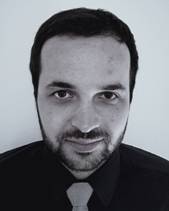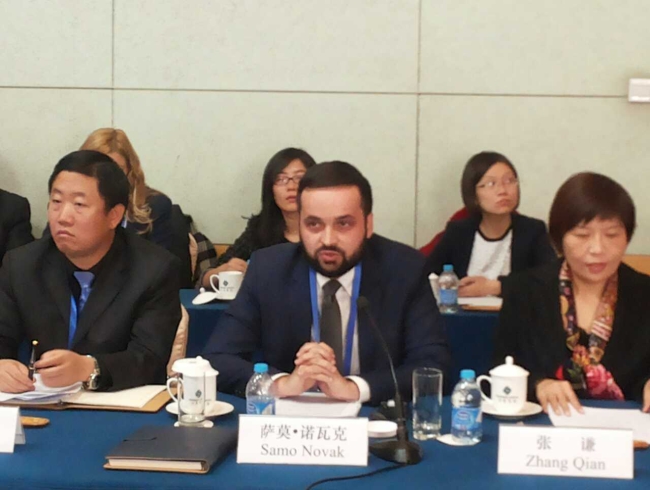Samo Novak

Samo Novak
斯洛文尼亚现代中间党国民议会主席政治顾问
大家好,我是萨莫·诺瓦克,我来自斯洛文尼亚,很高兴能来北京参加第二届中国与中东欧青年政治家论坛。

斯洛文尼亚现代中间党国民议会主席政治顾问诺瓦克:“16+1”合作会促进和丰富
欧中关系与合作。
Distinguished guests,
ladies and gentlemen,
it is a great pleasure for me to address such a diverse crowd of colleagues and friends from China and Central and Eastern European countries, who all share a similar vision of a united, peaceful, and prosperous future. Tectonic economic, political, and social changes that we have witnessed in the past three decades have taught us not only that globalization is an inevitable process, but also that it is a process that has made the world increasingly interdependent - in other words, it has created a world underpinned by a growing need for cooperation between all members of the international society.
This event, which we are all taking part in, represents a genuine step forward in addressing such a need. The cooperation between Central and Eastern European countries and China through the so-called ‘16+1’ format represents an invaluable platform for all partner states to identify common goals and devise mechanisms for transforming them into reality. Through this very platform, we will be able to further strengthen our traditionally friendly ties, create shared experiences for learning and establish new channels of dialogue, enhance our mutual trust and understanding, and - most of all - explore new opportunities for cooperation in the most creative ways possible.
In this regard, I wish to express my sincere gratitude to our Chinese hosts, who have made the last couple of days simply unforgettable. This being my first time in China and in Beijing, I will make sure that my experiences and impressions from what I have seen at this forum are shared with my colleagues and peers back in Slovenia.
In terms of the opportunities and challenges facing our cooperation, please allow me to focus on two broader perspectives to the issue at hand - a strategic and a structural one.
Form a strategic point of view, we are all yet to develop an even more comprehensive understanding that in the framework of cooperation between CEE countries and China, the European Union does not represent an external factor to our enriched relationship but rather an internal one. With eleven of the countries participating in the ‘16+1’ format already being members of the EU, and five of them stepping firmly on their way towards European integration, building upon our friendly relations does not represent a competitive process but rather a complementary one to that of the strategic partnership and the strategic agenda for cooperation between China and the EU. Our cooperation within the ‘16+1’ format does not undermine the invaluable processes established between Brussels and Beijing; on the contrary, it complements and enriches them. Taking into account the traditionally friendly relations between China and the region of Central and Eastern Europe, the further development of our cooperation strives for a more balanced distribution of benefits deriving from Europe’s relations with the biggest and one of the fastest growing, most progressive, and highly innovative economies on the Asian continent. Our enhanced cooperation can thus fill in certain development gaps that the European Union - particularly in times of recovery from a global economic and financial crisis - hardly has the capacity to address in their entirety. A better developed Central and Eastern Europe therefore represents the path to a more politically stable and economically sound Europe as a whole.
And this is precisely what global players such as China and the EU wish for; a reliable partner in an interdependent world. I am confident that CEE countries can rise to the challenge and provide valuable contributions in making this triple win-win-win jigsaw puzzle a reality. As long as we build on some of the common experiences deriving from the tremendous socio-economic transformations that our countries have gone through, and with which we have opened up to the world, we will be able to identify common needs and satisfy common goals.
Secondly, we also should think creatively about the qualitative structure of the framework in which cooperation between China and CEE countries takes place. We have to focus our efforts into identifying points of synergy between our countries and identify appropriate people- and knowledge-exchanges accordingly. For example, this forum of young leaders - in line with the 2014 Belgrade guidelines - represents an invaluable complementary measure to high-level summits that set the crucial pace of our cooperation. Here, young people can exchange opinions on various questions related to the future of our states and societies, build common visions on development and innovation and establish important links for future activities between our countries. These kind of processes establish invaluable networks of social capital and represent one of the most important investments of them all - investments into human beings, into human capital. I am therefore throughly convinced that one of the opportunities and potentials of our cooperation lies in an even more intensive exchange of opinions not only between young political leaders, but also between young people that exhibit leadership as the key drivers of development - outstanding students, young innovators and entrepreneurs, musicians, artists, and more. This way we could further build upon our mutual understanding and try to operationalize the very theme of this year’s forum - mobilizing youth as one of the key agents with the ability to transform our dreams of a further developed future into reality.
Ladies and gentlemen,
I wish all of us a fruitful discussion, in which I hope we will delve deeper into the possibilities and opportunities that await our partnerships in the years to come.
Thank you very much.





